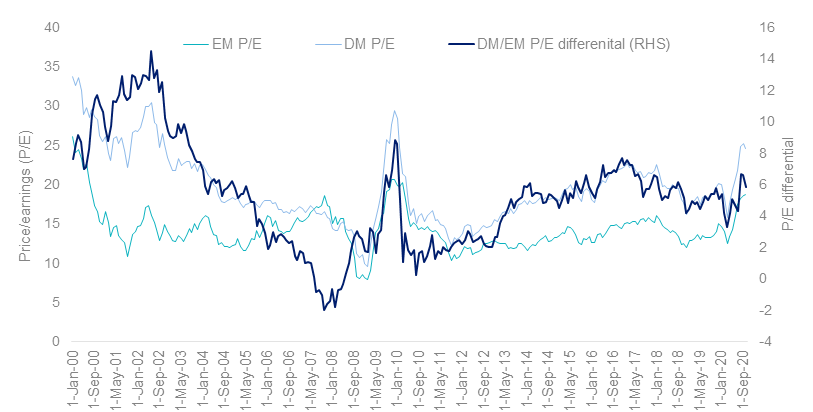The rhyme of history
The quote “History doesn’t repeat itself but it does rhyme” has been attributed to Mark Twain.
The rhymes between today’s equity markets and the markets back in 1999 have been drawn by a number of industry pundits over recent weeks:
- IPOs hitting 1999-like numbers;
- Technology is dominating the performance of the US equity markets; and
- Retail investors flooding the markets.
This time much of the performance of the US equity markets has been driven by just a handful of stocks – FAANGM stocks. If they fall, the whole US market will fall with it.
September’s volatility of the NASDAQ, in particular, has highlighted the importance of considering company valuations.
Another similarity of 1999 is that emerging markets, relative to developed markets are cheap.
Developed market bubble?
While the FAANGM giants, Facebook, Amazon, Apple, Netflix, Google owner, Alphabet and Microsoft, have been powering the returns of the S&P 500 and NASDAQ, their tumble in September reveals that that momentum could stop at any time.
Investors that have had these FAANG stocks in their portfolio have been well served by soaring valuations. But how high can they continue to go?
These concerns have caused many investors to wonder if we are witnessing another tech bubble as we did in 1999. Some of the similarities are eerily reminiscent of those heady days. IPO activity was the most active in the past 20 years by proceeds from IPOs and the second highest third quarter by deal numbers in the third quarter of 2020, according to the Global IPO trends: Q3 2020 report published by EY and Dealogic. Additionally, retail investors this time around, or ‘Robinhood investors’, are propping up volumes and liquidity.
It was also at the turn of the century that emerging market equities were cheap relative to developed markets. Now emerging markets haven’t been this cheap, relative to developed markets since 2017.

Source: MSCI, as at 31 October 2020, EM is MSCI Emerging Markets Index. DM is MSCI World ex Australia Index. P/E differential is DM P/E minus EM/P/E.
Continued US dollar weakness
Beyond valuations, there are other reasons to consider emerging market equities in the current environment, including a weaker US dollar.
The US dollar has fallen since the COVID-19 crisis as the US Government and the Fed implement unprecedented monetary and fiscal policies. US Federal debt is at just over US$20 trillion and is expected to increase another US$13 trillion in the next decade, according to the Congressional Budget Office, driven by slow growth, an aging population, rising health care costs and debt service payments. This all puts pressure on the US dollar, which generally benefits emerging market equities.
If history does rhyme
In recent years, emerging markets have underperformed developed markets dramatically, as the table below shows, with gains of just 4.62%p.a. from 1 January 2018 to 31 October 2020, underperforming developed markets by 4.64%. However, emerging markets have outperformed developed market equities significantly over the long term but it's been a rocky ride.
Australian investors with global equity portfolios that had exposure to emerging markets equities were rewarded in the aftermath of the 1999 tech crash. They then underperformed in the aftermath of the GFC, prior to a stellar year in 2017. Since then, emerging markets have underperformed developed markets as the US dollar surged.
But this could change in the months and years ahead.
Not already a Livewire member?
Sign up today to get free access to investment ideas and strategies from Australia’s leading investors.
5 topics

